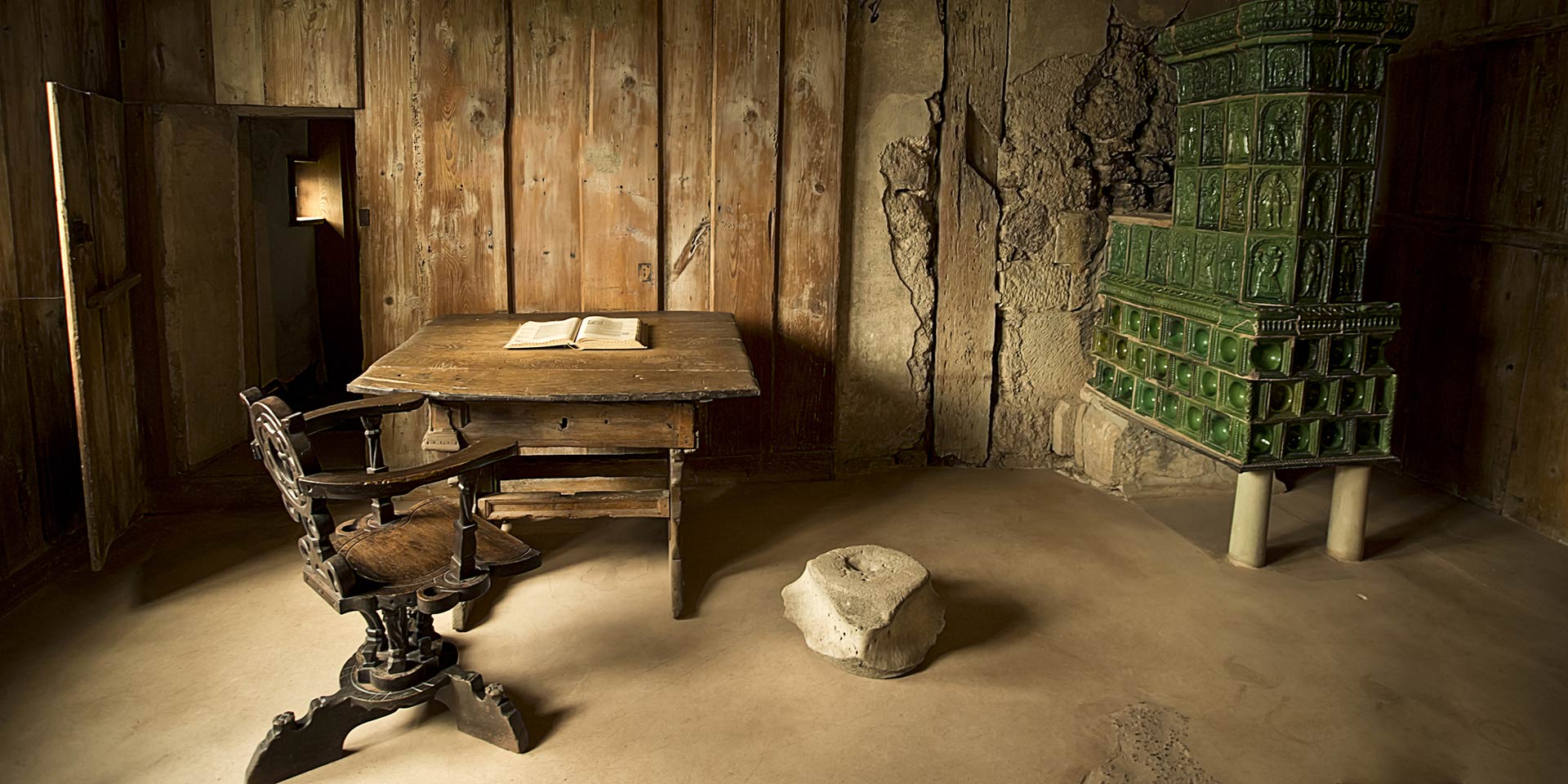Martin Luther believed that he knew exactly what God expected of him, and in the tireless endeavour to please God, he came to the point of hating Him.
One truth that many of us can identify with is that the road to salvation sometimes seems hidden from us because it is covered by too many things that we are sure of.
The accident that killed my friend Lavinia is one of those few events of which I can say, without fear of being hypocritical, that it marked my soul in the first quarter of my life. We hadn’t been very close. But I admired her qualities: her creativity, the generosity with which she shared her art and her abilities with those around her, devoid of pretensions and the snobbery that eats people up on the inside, the relaxation with which she smiled at life…
All these things turned the times we spent together into pure joviality, in my mind. The morning I found out that she was gone, an icy fog settled over the clearness I associated with Lavinia’s face, and wiped out the knowledge of God I had gathered until then.
I wondered at the reason behind this in dozens of ways, as of course many did before and after me. For me, however, the most unexpected “Why?” was actually a “How come?” How come God allowed her to die when she was so useful to Him here? How could He let such a thing happen, just after she had announced on a radio show the beautiful plans by which her talents would speak in the most creative way about Him, about God?
Perhaps to some, the answer I came up with is not even deemed worthy of being called an answer. The tragic event, however, shook me so much that, looking back, I think I was still functioning mainly out of a sense of routine, the destruction of which would have meant extra effort, and due to other unavoidable worries, that fragmented my dilemmas related to Lavinia’s death, instead of exacerbating them. It seems that, at times, things like these happen too.
I told myself then—and I don’t think I ever believed it more strongly—that God is probably a completely different person than the one I thought I could imagine. I did not claim to know God, probably out of the natural humility of being human, but I thought I was in a fairly safe area of familiarity when it came to Him, probably out of the same natural sense of pride that each of us has.
Lavinia’s sudden disappearance was a shock to my faith. To my amazement it was one that, in the end, revived it, rather than destroyed it. The impact was so subtle that now I can’t understand why I didn’t have this new conviction from the beginning.
There are so many injustices happening in this world, so much suffering without a visible meaning, so much pain that is unaccounted for! In this whole picture, Lavinia’s loss was, and is, like a drop in the ocean. Because in the world of people who do not live protected by ignorance or lack of self-induced compassion, the ungraspable suffering is an aggressive reality that constantly claims to be acknowledged as such. In the case of Christians, this assumption must occur simultaneously—however absurd this may seem—with an unshakable trust in God’s goodness and love.
Theodicy, I was about to discover, is the branch of theology that tries to decipher and create ways in which this is possible. For me, however, at that moment, theodicy was reduced to one thing: God is not who I think He is. Not that I would have considered Him worse, or better, but deeply unknown.
I thus found myself in a kind of spiritual amnesia, in which not all my memories had been erased, but many of them had been rendered meaningless. I had to find a new meaning for them now, compatible with the new experience I had with God. I needed to change the way I related to Him.
Although, in itself, the moment of this realization was apparently a denial of the things I thought I knew about God, it was also a positive conversion, in the sense that it led me to believe that God is “awesomely”[1] unknown. This awareness, against the background of the Christian education I received, manifested itself as an inevitable need to know more about the true God—as real as possible, no matter how little this may end up being.
“God grant, it was not an apparition of the Devil.”
I instinctively remembered the experience described above when I read the story of Martin Luther’s conversion. Locked up in a cell in the tower of the Augustinian monastery in Wittenberg, he read Romans 1:17 and felt that “a totally other face of the entire Scripture showed itself to me”, as he would confess. In this new light, browsing all of Scripture from memory, he discovered completely different meanings for key expressions in theology such as “work”, “power”, “salvation”, and the “glory” of God. In order to understand the revolution that took place in the soul of the great reformer more deeply, I wanted to know more about what he experienced then.
Fortunately, a year before his death, Luther recorded the moment of that revelation in a few paragraphs. And, surprisingly, he himself placed it in the context of an anxious past: “Though I lived as a monk without reproach, I felt that I was a sinner before God with an extremely disturbed conscience. I could not believe that he was placated by my satisfaction.
“I did not love, yes, I hated the righteous God who punishes sinners, and secretly, if not blasphemously, certainly murmuring greatly, I was angry with God, and said, ‘As if, indeed, it is not enough, that miserable sinners, eternally lost through original sin, are crushed by every kind of calamity by the law of the Decalogue, without having God add pain to pain by the gospel and also by the gospel threatening us with his righteousness and wrath!’”[2]
The fear of God was dominant in Luther’s formative years. Historians who have reconstructed his past from short stories, like little puzzle pieces, said that Luther became a monk when—out of fear of dying in a raging storm that caught him in the open air—he shouted instinctively: “Holy Anne, if you save me, I will become a monk!” His acquaintances couldn’t believe it when they heard the news. They would have rather thought that Luther would become a monk because of the sadness caused by the murder of a close friend.[3]
In turn, Luther’s father, who was planning a brilliant law career for his son, was saddened by the money wasted on his son’s education, a son who was now ready to isolate himself within the walls of a place of worship. “And then he must have added what to him was the clinching argument, that he had been called by a voice from heaven out of the thunder cloud.” “God grant, it was not an apparition of the Devil”,[4] the reformer’s father is believed to have said in a moment of anger.
Humbled before God
Becoming a monk, Luther traded his father’s authority for the endless rules of the monastery, which prescribed how and when to worship, how to walk, how to speak, where and when to look, and how to hold cutlery when eating. Every three hours he had to leave the cell for work, except during the night—the next service after midnight being at six in the morning. Then he would start all over again.
This way of life made the monks sick one by one. So much so that some even paid others to pray for them when it was their turn. Not Luther. If, due to weakness or illness, he was unable to attend the service, Luther made sure to make up for the absences at the end of the week. But that didn’t mean he was happy with himself. There were still many other areas in which he could make mistakes: he could still look uncontrollably in a way or in a direction he should not, or he could laugh by mistake or sing falsely.
There was, of course, always the opportunity for confession, and Luther used it to such an extent that he exhausted his confessors, whom he kept for up to six hours in the little room in which he confessed his sins. But that wasn’t enough either. It was not just a matter of fulfilling all rituals, for Luther knew very well that no prayer of forgiveness is received unless it springs from a truly repentant heart, and he often felt his repentance tainted by the ungodly motivation of the fear of consequences. Where would a young man, tortured to such an extent by his own conscience, end up?
The climax, according to some historians, was at the age of 24, when Luther was to hold his first Mass as a priest. If, until then, the feeling of his own sinfulness had led him to pray to all the saints, but never directly to God, now he could not avoid the confrontation. The Mass brought the priest right before God the Father, before whom he was to appear as a representative of His church. Out of fear for this unmediated encounter, Luther threw himself on the church floor, pierced by the nothingness of his soul. Some even say that he almost fainted[5] from the horror of meeting the Judge. But this peak was not the end of fear.
Luther continued to live with the fear of divine judgment for years. He calmed his fear by committing himself to humiliating rituals of redemption from his own sin or the redemption of others from Purgatory. Thus, on a “duty” visit to Rome, he ascended the steps of the Scala Sancta, on which Christ Himself supposedly ascended before being taken before Pilate, and which was afterwards supposedly transmuted to Rome. At the top of the steps— which he climbed as he kissed each one of them, after uttering the Lord’s Prayer—in addition to the pervasive guilt, a feeling of doubt as to whether any of this helped began to grow in his heart.
The spiritual world in which Luther lived was visibly anchored in relics and rituals. Behind the scenes, however, were the political and financial interests of corrupt clergy. It is likely that this also contributed to Luther’s existential anxieties, in addition to the strict education he had received at home. The medieval atmosphere, in which death was a constant threat, physical misery, and the general lack of education (which was not only discouraged but even ridiculed those who made an effort to overcome their condition), must have also had a strong influence.
Against this background, the clergy’s immoral practices, which included selling indulgences to round off their income, seemed to the monk (who had meanwhile become a theology professor) a blasphemous caricature of real repentance, which he himself was aware he could not produce on his own.
Luther pinned his 95 theses to the door of the Wittenberg Cathedral at a time when he had yet to find a saving answer for his own limitations. He did not know how he would be saved, but he knew for sure that the indulgences sold in the market, like raw fish or smoked pork barrels, were not the way. He despised this practice so much that he was not afraid to provoke a public debate on indulgences.
And it was not until two years after the spark that ignited the great Protestant Reformation that Luther came to understand that salvation cannot be bought with works or the pure motivation that he tried to self-induce—since this too would have been an ultra-refined form of works—but that salvation is a pure gift. He understood that we are “saved by faith”, not by humility, however profound it may be. To get to this point, however, the reformer had to go through a night of deep darkness and just as deep a night in his monk’s cell.
In the footsteps of Paul’s understanding
Luther had once more, for the umpteenth time, set out with “burning desire” to understand what St. Paul wanted to convey through his Epistle to the Romans. “After days and nights of meditation,” he recounted, a verse enlightened his mind and he felt that he was “reborn and as though I had entered paradise through the opened gates.”
The verse was the essence of all that he had hated before in Christianity, for the text said: “For in the gospel the righteousness of God is revealed—a righteousness that is by faith from first to last, just as it is written: ‘The righteous will live by faith’”. If, until that moment, he had interpreted “the righteousness of God” as that righteousness by which He can do nothing but punish and exterminate sin together with the sinner, from then on, he understood that righteousness is, in fact, the reason why God saves, strictly as a gift of His pure goodness, the sinner incapable of doing any pure good on their own.
Because God is infinitely good (that is, precisely because He is infinite love), not even the purest deeds humans are capable of could rise to the standard of God’s purity. Therefore, because in His goodness He still wants to save humans, God does not wait for humans to do anything, but He Himself, by His infinite power, saves humans from their deep sin.
The Luther who had hitherto been convinced that the solution to the problem of self-love—the abominable root of all sins—is self-hatred (practiced through rituals of self-punishment to purify repentance), understood for the first time that salvation does not come from hatred, but from righteousness. Not from his own righteousness, but from God’s own righteousness.
How would he benefit from this salvation? “By faith”—that is, by trusting God’s promise that He will forgive. “This is the sin of the world,”[6] he would write in On the Freedom of a Christian, “that it does not believe on Christ. Not that there is no sin against the law besides this; but that this is the real chief sin, which condemns the whole world even if it could be charged with no other sin.”
But if the lack of faith is the supreme sin, then the presence of faith is not the supreme good deed. That’s why Michael Reeves wrote: “For [Luther], the question ‘Have I got enough faith?’ completely misunderstands what faith is”.[7] Here language shows its deficiencies, and Reeves suggests that “it might be more helpful to describe what Luther discovered as ‘justification by God’s word’ instead of ‘justification by faith’, because it is God’s word that justifies here, not our faith.”
Faith, thought Luther, is not some inner resource we must summon up. “If it were, it would by his definition be sin” because it would attribute to the intensity of man’s faith what God does for man. “By looking to and so relying on itself, rather than Christ,” as Reeves rightly put it, faith would usurp God’s role in man’s salvation and thus become an idol.
You must go through the perpetually open gate to enter
However, the mentality of gaining salvation by works is so deeply rooted in the Christian tradition that even Luther’s spiritual followers have difficulty in endorsing the fact that “justification by faith” is not, in practice, the opposite of “justification by works,” but a completely different paradigm. Unlike works, which are an active way of working for salvation, faith is, in its most important phase, passive: it has nothing to do other than to believe God’s promise that He will take care of the human’s eternal future with love and kindness.
If they depart from this primary trust, there is no need for humans to do anything else for their salvation. But they will do good, because the one who trusts God enters into communion with Him, and thus, through man, it is still God who does good. That is why Paul also confessed that he found no reason to praise himself: “May I never boast except in the cross of our Lord Jesus Christ.”[8]
However, when viewed as unmediated, faith remains a mystery. Although it is passive, it often needs to be defended, nurtured, cultivated, and actively shared. Thus, as a reformer, Martin Luther redeemed the time he had invested in the crucifixion of the self from the time when he believed that this was the only way he would be saved.
The same burning sweat that lingered on his forehead in the confessional room that was too narrow for his sins, appeared again, this time as a result of his new effort to prove to the believers enslaved by the corrupt clergy that even if the heavens were locked up (although they are not), they could never be unlocked with works or money.
What made Luther’s mission easier back then is the same thing that makes our own struggle for faith unavoidable: God created the world in such a way that it made our existence dependent on faith. This is another reason why faith is not the equivalent of works: humans can’t do anything but believe; one thing or the other. But they must believe.



















